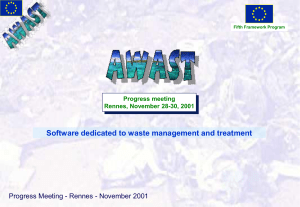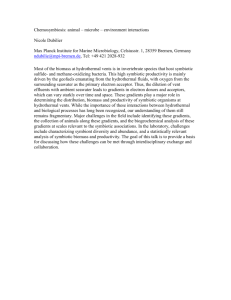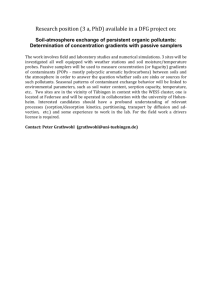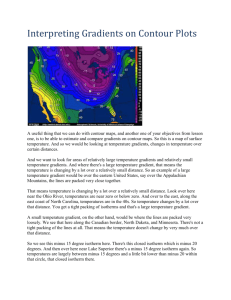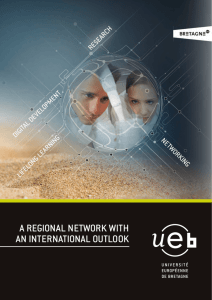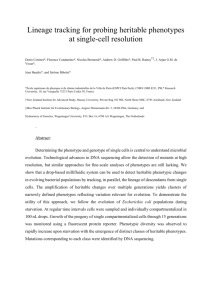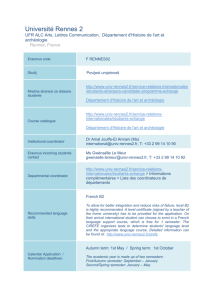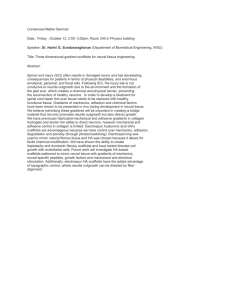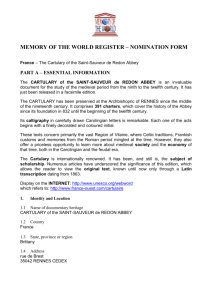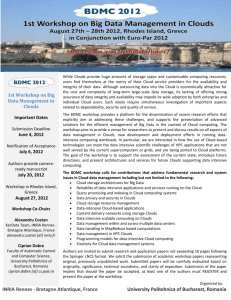PhD theme in
advertisement
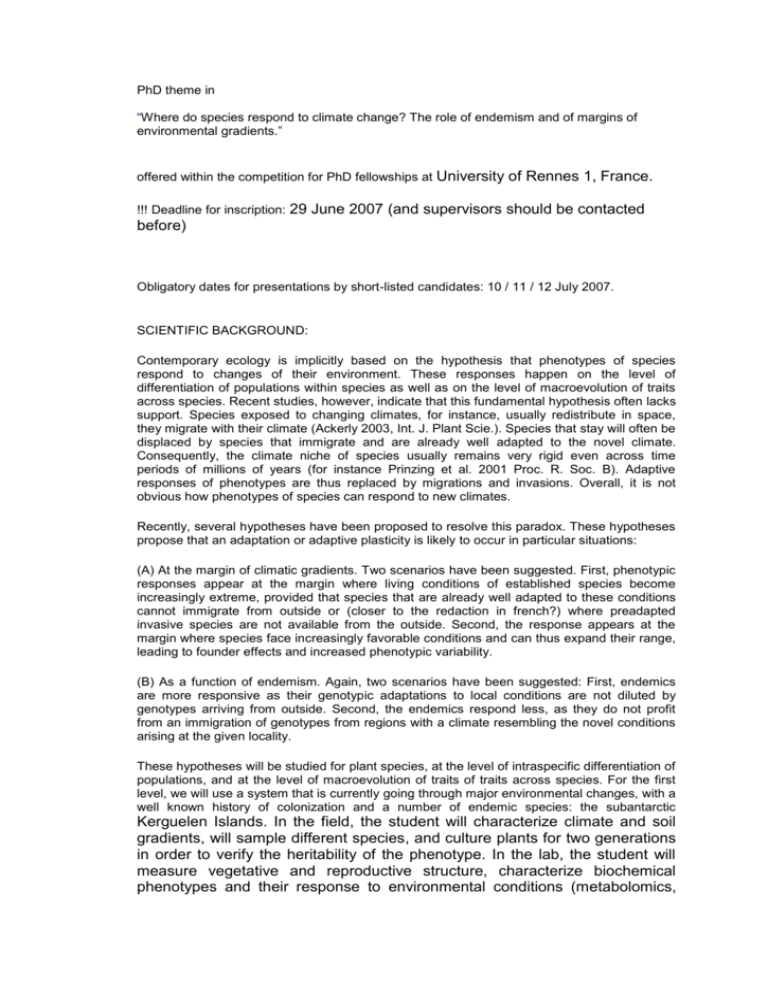
PhD theme in “Where do species respond to climate change? The role of endemism and of margins of environmental gradients.” offered within the competition for PhD fellowships at University !!! Deadline for inscription: of Rennes 1, France. 29 June 2007 (and supervisors should be contacted before) Obligatory dates for presentations by short-listed candidates: 10 / 11 / 12 July 2007. SCIENTIFIC BACKGROUND: Contemporary ecology is implicitly based on the hypothesis that phenotypes of species respond to changes of their environment. These responses happen on the level of differentiation of populations within species as well as on the level of macroevolution of traits across species. Recent studies, however, indicate that this fundamental hypothesis often lacks support. Species exposed to changing climates, for instance, usually redistribute in space, they migrate with their climate (Ackerly 2003, Int. J. Plant Scie.). Species that stay will often be displaced by species that immigrate and are already well adapted to the novel climate. Consequently, the climate niche of species usually remains very rigid even across time periods of millions of years (for instance Prinzing et al. 2001 Proc. R. Soc. B). Adaptive responses of phenotypes are thus replaced by migrations and invasions. Overall, it is not obvious how phenotypes of species can respond to new climates. Recently, several hypotheses have been proposed to resolve this paradox. These hypotheses propose that an adaptation or adaptive plasticity is likely to occur in particular situations: (A) At the margin of climatic gradients. Two scenarios have been suggested. First, phenotypic responses appear at the margin where living conditions of established species become increasingly extreme, provided that species that are already well adapted to these conditions cannot immigrate from outside or (closer to the redaction in french?) where preadapted invasive species are not available from the outside. Second, the response appears at the margin where species face increasingly favorable conditions and can thus expand their range, leading to founder effects and increased phenotypic variability. (B) As a function of endemism. Again, two scenarios have been suggested: First, endemics are more responsive as their genotypic adaptations to local conditions are not diluted by genotypes arriving from outside. Second, the endemics respond less, as they do not profit from an immigration of genotypes from regions with a climate resembling the novel conditions arising at the given locality. These hypotheses will be studied for plant species, at the level of intraspecific differentiation of populations, and at the level of macroevolution of traits of traits across species. For the first level, we will use a system that is currently going through major environmental changes, with a well known history of colonization and a number of endemic species: the subantarctic Kerguelen Islands. In the field, the student will characterize climate and soil gradients, will sample different species, and culture plants for two generations in order to verify the heritability of the phenotype. In the lab, the student will measure vegetative and reproductive structure, characterize biochemical phenotypes and their response to environmental conditions (metabolomics, polyamines, growth regulators contributing to stress tolerance; e.g.; Hennion et al. 2006; Heat Shock Proteins will be studied in collaboration). For the second, macroevolutionary, level we will profit from the regional flora that is best known in terms of phylogenetic relationships, life history traits, and distribution along environmental gradients; the flora of central Europe. The student will reconstruct characters of ancestors, i.e. their positions along environmental gradients and their degree of endemism, within habitats and regions. The student will identify macroevolutionary changes of life histories and certain physiological traits. Finally (s)he will test whether endemism of ancestors, or their position along environmental gradients, influence the evolution of the life history and ecophysiology of the descendants. SALARY / ORGANIZATIONAL BACKGROUND: A PhD fellowship by the Ecole Doctorale “Vie, Agro, Santé” ( http://www.vas.univ- rennes1.fr/ ) for three years, approx. > 1040 Euros/month (which can luckily be backed by teaching assistance). Please note that candidates are selected by a committee of the Doctoral School, not by the supervisors of the theses (they can, however, contribute their opinion). Finally, travel costs will not be reimbursed by the Ecole Doctorale, but for the candidates that we are particularly interested in, we as supervisors of the theses can contribute to traveling costs. If selected, supervision is guaranteed by the director and codirector of thesis, plus a committee of internal and external scientist evaluating the overall progress. For foreign applicants: a certain proficiency of French is expected at the end of the thesis. In fact, the introductory and concluding parts of the thesis have to be in French. Such proficiency is indeed useful to more easily integrate. At the same time, everybody in Academia is capable and willing to communicate in English with a foreigner, and French students are obliged to take courses in English. For formal reasons, the application has to contain a one-page summary of your MSc thesis, and a half-page summary of earlier theses or reports; and this also has to be in French. The rest of the application (c.v., expertise, list of all kinds of scientific communications, research interests and outlook, letters of reference, transcripts) as well as the presentation can be in English. FORMAL QUALIFICATION OF THE CANDIDATE: French DEA / Master II or equivalent (MSc, Diplom….) in biology or related field from a country of the European Union or the numerous countries having signed the “Accord relatif à l’Espace Européen de l’Enseignement Supérieur” (see http://www.dr.education.fr/Alloc_doc/alloc_2.html). Preferably from 2007! The ranking of your Master II / DEA / MSc will be important (have you been the first or the 33 rd out of 33 candidates?). If this available please, add it. If it is not available in your country, please explain so. See also rennes1.fr/scripts/consultation/rubrique.php?rub_id=163&pag_id=110 http://www.vas.univ- SCIENTIFIC QUALIFICATION OF THE CANDIDATE: The candidate should possess competences in physiology and/or evolutionary ecology, in biochemical analyses, statistical hypothesis testing and/or statistical analyses of trait evolution. FURTHER INFORMATION ON THE DOCTROAL SCHOOL AVAILABLE AT http://www.vas.univ-rennes1.fr/scripts/index.php?RUBIDSITE=1; APPLICATIONS FORM AVAILABLE AT http://www.vas.univ-rennes1.fr/scripts/modules/formDyn/fiche.php?FIC_ID=5&rub_id=115 (but please contact us prior to submitting your application) HOST INSTITUTION The host institution is the Research Unit “Ecosystems, Biodiversity, Evolution”, co-funded by University of Rennes 1 and Centre National de la Recherche Scientifique, harboring 58 researchers and docents. It was ranked “A” in the national evaluation of research institutions. Several further research institutions in ecology and evolutionary biology exist at Rennes. RENNES has approximately 200 000 inhabitants and is the capitol of the Bretagne region with exceptional coastal and mainland landscapes, and a french-celtic heritage (http://www.regionRennes bretagne.fr/CRB/Public/rubriques_thematique/visiter_la_bretagne/la_bretagne _une_reg/la_bretagne_en_image/). English is spoken everywhere in Academia, but not necessarily outside. Like in any French city, child care is excellent (almost for free, no waiting list, nearby). Several bilingual FrenchEnglish schools are available at all levels of education, as well as one FrenchGerman grammar school. IF INTERESTED PLEASE CONTACT THE SUPERVISORS: Françoise Hennion, Francoise.Hennion@univ-rennes1.fr; *and* Andreas.Prinzing, andreas.prinzing@univ-rennes1.fr Université de Rennes 1 Unité Mixte de Recherche CNRS 6553 « Ecobio » : Ecosystèmes - Biodiversité - Evolution Team « Ecology of Diversification » Campus de Beaulieu, Bâtiment 14A 263 Avenue du Général Leclerc 35042 Rennes Cedex, France http://ecobio.univ-rennes1.fr/Fiches%20perso/fhennion/fhennion.htm; http://ecobio.univ-rennes1.fr/Fiches_perso/Fiche.asp?pseudo=APrinzing http://ecobio.univ-rennes1.fr/Fiches_perso/Banque/publi1_APrinzing.doc

